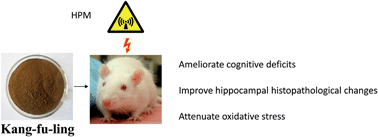Neuroprotective effects of dietary supplement Kang-fu-ling against high-power microwave through antioxidant action
Abstract
Kang-fu-ling (KFL) is a polybotanical dietary supplement with antioxidant properties. This study aimed to evaluate the potential protective effects of KFL on cognitive deficit induced by high-power microwave (HPM) and the underlying mechanism for this neuroprotection. The electron spin resonance technique was employed to evaluate the free radical scavenging activity of KFL in vitro and KFL exhibited scavenging hydroxyl radical activity. KFL at doses of 0.75, 1.5 and 3 g kg−1 and vehicle were administered orally once daily for 14 days to male Wistar rats after being exposed to 30 mW cm−2 HPM for 15 minutes. KFL reversed HPM-induced memory loss and the histopathological changes in hippocampus of rats. In addition, KFL displayed a protective effect against HPM-induced oxidative stress and activated the nuclear factor-E2-related factor 2 (Nrf2) and its target genes in the hippocampus of rats. The Nrf2-antioxidant response element (ARE) signaling pathway may be involved in the neuroprotective effects of KFL against HPM-induced oxidative stress. In summary, the dietary supplement KFL is a promising natural complex, which ameliorates oxidative stress, with neuroprotective effects against HPM.


 Please wait while we load your content...
Please wait while we load your content...